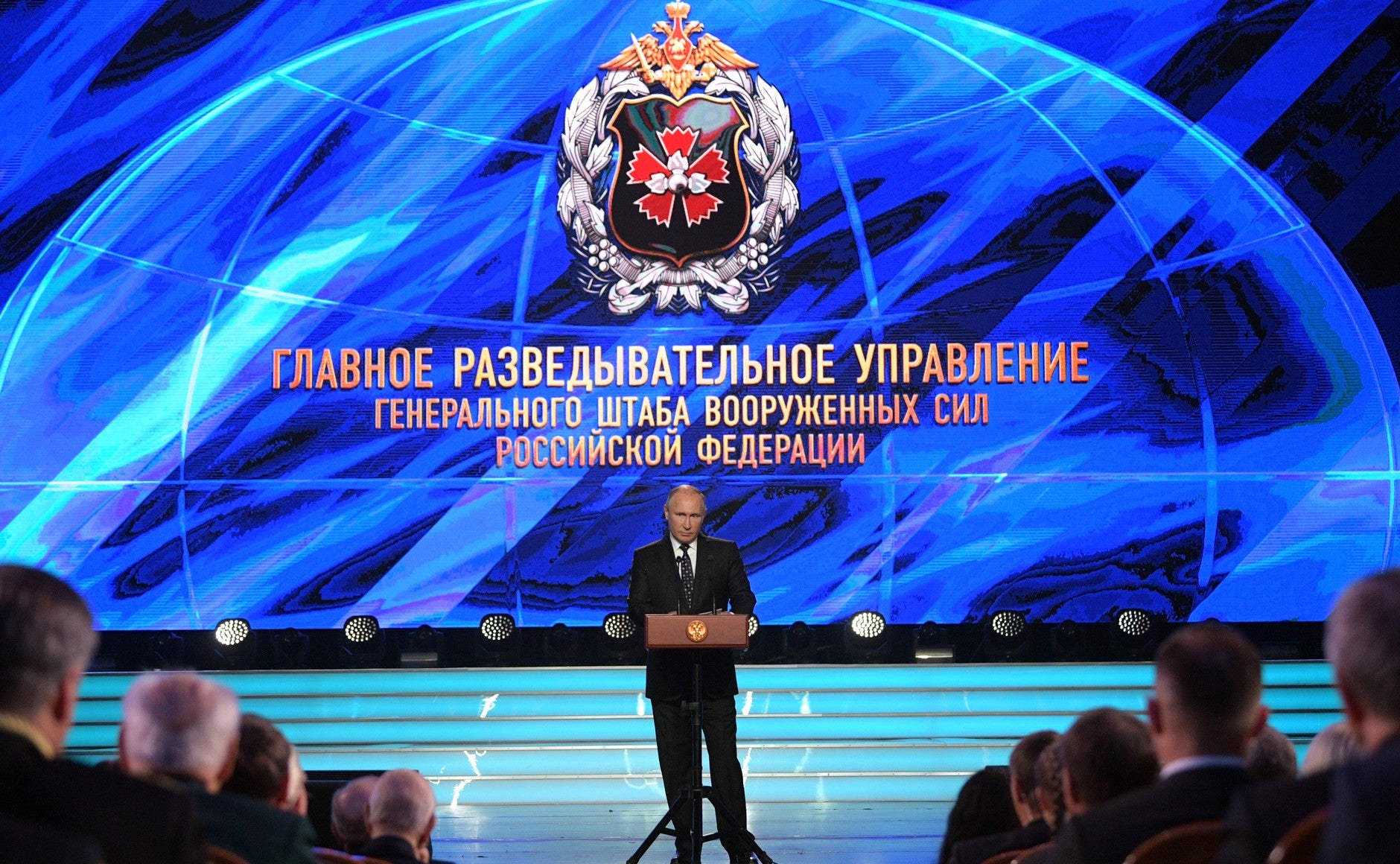'Legendary' GRU military intelligence agency should have historical name restored, says Putin
'Intelligence is an important and integral part of military science,' says Russian president

It was never likely Vladimir Putin would criticise his military intelligence agency on its birthday. But in carefully constructed comments, made at a celebration of 100 years of the under-fire agency, he offered his strongest backing yet.
Far from being reformed out of recognition, the “legendary” service should return to its historical name, the GRU, he said — and that would mean reinstating the word “intelligence” to its title.
“It’s not clear where the word 'intelligence”' went to,” he told his audience at the Russian Army Theatre in Moscow, to applause. “Intelligence is an important and integral part of military science.”
Founded within a year of the revolution that brought the Bolsheviks to power, the Soviet intelligence agency became known as the Main Intelligence Directorate, or G.R.U., in 1940. It carried that title until 2010, when it was renamed the G.U., or Main Directorate, as part of a series of reforms by then Minister of Defence Anatoly Serdyukov.
The general direction of those liberal reforms was to separate civil and military roles. Unsurprisingly, they went down very badly with the military complex. The vast majority of officials — and the general public — continued to refer to the Main Directorate using its old name.
By indicating he shared their irritation with an “unfathomable” change, Putin seemed to be delivering a much-needed morale boost to the agency.
Dutch security services expel Russian spies over cyber plot
Show all 23“This was a psychological and political show of support by Putin,” says Tatiana Stanovaya, CEO of the political analysis firm R.Politik. “He was telling them that he would support them to the end regardless of the failures and their poor fortunes.”
The GU/GRU’s centenary year has swung from highs to lows.
The service entered its 100th year in a buoyant state, having overcome twenty years of decay and job losses. For the first decade of Vladimir Putin’s rule, they were seen as the junior partner to Federal Security Service (FSB) and Foreign Intelligence Service (SVR). But the second decade saw a turnaround. Their activist roles in the Syrian and Ukrainian campaigns earned them a place at the intelligence high table.
This was a psychological and political show of support by Putin. He was telling them that he would support them to the end regardless of the failures and their poor fortunes.”
The service is ending the year amid disarray and derision. Its claims not to have been involved in the nerve agent attack in Salisbury look more ridiculous with every press conference. And to make matters worse, the unveiling of the two men suspected of carrying out the attack has apparently compromised a much larger agent database. Several hundred previously secret identities might have gone public.
For Mr Putin, those failures are secondary to a much larger struggle with the West, says Ms Stanovaya.
“He believes the GRU are the victims of this story and has made it very clear that you shouldn’t expect any radical changes in the service,” she says. “Even personnel changes, which may yet happen, will not take place immediately.”
The public show of support was not surprising, agrees Andrei Soldatov, author of The New Nobility and a veteran watcher of Russian security services. The president wanted to emphasise he was “fine” with the military — and G.R.U. by extension — playing a prominent role in Russian politics.
“There is a general consensus [across government] to let the active guys take all the heat — so they can carry on in the shadows.”
The Kremlin’s focus has instead fallen on leaks that allowed activists to uncover the identities of agents. It is well-known that even the most sensitive government databases have been available online and in certain markets. The Kremlin wants to put an end to that. According to the Rosbalt news agency, which regularly “breaks” security agency news, arrests have already been made.
“It’s clear Putin has given the order for the leaks to stop,” says Ms Stanovaya. “That’s where he sees the vulnerability. Far from dismantling the GRU, he wants them to end up stronger.”
Subscribe to Independent Premium to bookmark this article
Want to bookmark your favourite articles and stories to read or reference later? Start your Independent Premium subscription today.

Join our commenting forum
Join thought-provoking conversations, follow other Independent readers and see their replies